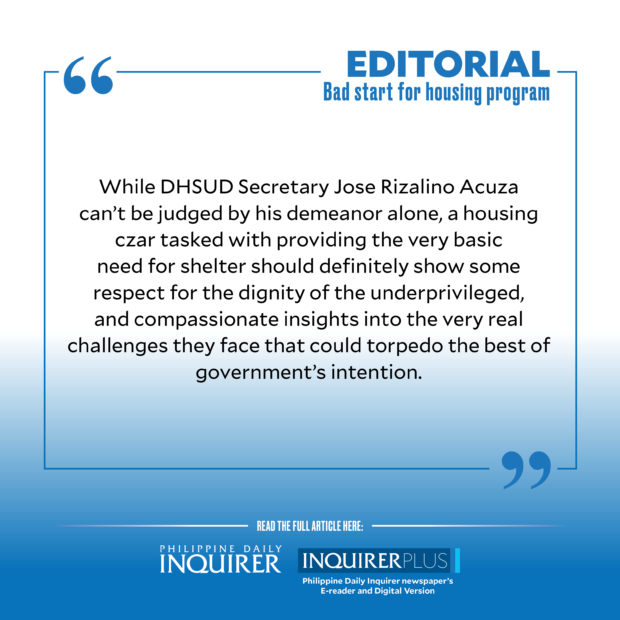If the housing czar appointed by President Marcos believes that some Filipinos are unable to pay for government-subsidized housing due to laziness, it doesn’t bode well for the ambitious plan to build one million housing units per year. This issue was raised during a budget hearing for the Department of Human Settlements and Urban Development (DHSUD), where House members pointed out that the housing program would require a significant amount of government subsidy and still be unaffordable for those earning minimum wage.
Under Executive Order No. 34 issued in July, the Pambansang Pabahay Para sa Pilipino Program (4PH) was identified as a flagship program meant to fulfill the constitutional mandate of providing decent and affordable housing to the underprivileged and homeless citizens. With a staggering housing backlog of 6.8 million as of 2022, the Marcos administration has set a target of building one million houses per year, totaling six million by the end of the President’s term. However, the viability of this plan is questionable.
For the year 2024, the DHSUD has proposed a budget of P5.40 billion, with P1.5 billion allocated for the government’s share in interest payments for 50,000 housing units. Marikina City Rep. Stella Luz Quimbo, vice chair of the House appropriations committee, raised concerns about the financial burden of the annual subsidy. She stated that the P1.5 billion for 50,000 houses is substantial, and with an additional 50,000 houses each year, the interest subsidies would become overwhelming. Housing Undersecretary Roberto Juanchito Dispo clarified that the estimated interest subsidy for one million housing units is P36 billion per year.
Apart from concerns about the government’s financial sustainability, the main issue with the 4PH plan is affordability for its beneficiaries. According to the 4PH manual, the government plans to construct multistory buildings in urban areas, offering units ranging from P1.12 million for a 24 square meter home to P1.63 million for 27 square meters. DHSUD Secretary Jose Rizalino Acuzar stated that the monthly amortization of P3,500 to P4,500 would be reduced to P2,000, with the government subsidizing a significant portion of the interest rate. However, even with this subsidy, the housing units remain too expensive for minimum wage earners, as pointed out by House Deputy Minority Leader Rep. France Castro. She described the 1 million housing target as unrealistic and stated that it is impossible for the poor to afford monthly payments of P3,500 when they only earn P610 per day. Castro emphasized that the poor cannot afford the proposed plan.
Secretary Acuzar deflected responsibility for raising the minimum wage, stating that it is the role of the Department of Labor and Employment. He emphasized that the Cabinet’s role is to provide housing for those who have work, stating that minimum wage earners are guaranteed to have their own homes. In Acuzar’s view, those who cannot afford the monthly amortization may be lazy. He said, “Those who won’t work will probably not have homes. It won’t happen if you’re lazy.” However, Gabriela party list Rep. Arlene Brosas countered this generalization, pointing out that the poor struggle due to harsh socioeconomic conditions, not laziness. Brosas highlighted the minimal wage increase and the inflated prices of basic commodities and services, stating that the 4PH program fails to address the needs of the poorest of the poor.
During the hearing, Acuzar also made a statement about the previous housing programs where the poor were relocated to far-flung resettlement areas. His comment was cut off, and he had to apologize for his insensitivity. This incident reflects a lack of understanding and a disdainful attitude towards the program’s intended beneficiaries. A housing czar should show respect for the dignity of the underprivileged and have compassion for the challenges they face. While Acuzar’s demeanor alone should not be the sole basis for judgment, it is crucial for the DHSUD to have genuine concern and empathy for the poor, which their current leader seems to lack.
In addition to adjusting their unrealistic targets, the DHSUD must prioritize genuine care for the poor, as they are responsible for providing the most basic need of shelter. The present leader of the department, Acuzar, should possess a mindset that focuses on the well-being of the less fortunate rather than profit, which may have been ingrained during his time as a property developer. This program requires a compassionate approach in order to truly succeed.
Denial of responsibility! VigourTimes is an automatic aggregator of Global media. In each content, the hyperlink to the primary source is specified. All trademarks belong to their rightful owners, and all materials to their authors. For any complaint, please reach us at – [email protected]. We will take necessary action within 24 hours.


